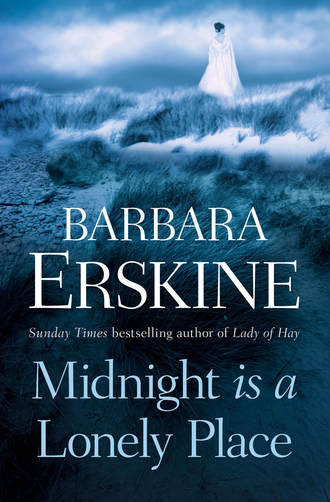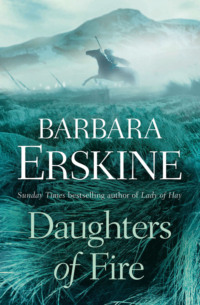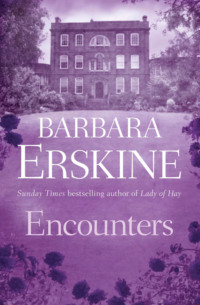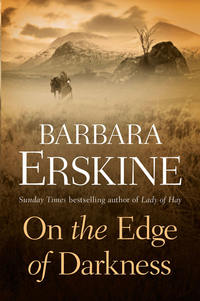
Полная версия
Midnight is a Lonely Place
Two of the bodies lay on top of each other, the man face down, his face pressed into the seeping wetness of the clay, his head at an angle, bent against his shoulder. The garotte was embedded deep in the strange desiccated blackness which was all that remained of his skin. He was naked save for the strip of tanned tree bark tied about his arm. It was the bark of the ash; the tree which was his totem; the tree for which he had been named – Nion.
The woman lay across him, hunched, contorted by the agony in which she had died. The fabric of her clothing was strangely intact. In one or two places the colour was still visible, though darkened by the chemical processes of clay and salts and decomposition. And by the blood. Out of sight, beneath her as she lay across the other body was a sword. It was a short sword, but sharp, corroded now to razor thin metal. One of her hands still clasped the hilt. The point was embedded between her ninth and tenth thoracic vertebrae.
XIV
Kate was stacking the dishes in the sink next morning when she happened to glance out of the window and saw Alison appear from the wood. The girl had a fluorescent green haversack over one shoulder and in her hand she carried a large red radio cassette player. Still exhausted and angry after her disturbed night Kate waited for her to approach the cottage, but Alison veered off the path and headed straight towards the shed.
Drying her hands Kate went outside. The storms of the night had passed and the day was bright and crisp with only the lightest wind blowing from the south.
‘Good morning.’ She stopped behind Alison as the girl groped inside the shed.
Alison jumped. She turned, her spade in her hand. ‘Hi.’ She did not look pleased to see her.
‘I thought you might be going to drop in and say hello,’ Kate said.
Alison shrugged. ‘I thought I’d get on.’
‘Fair enough. But first, haven’t you got some explaining to do about last night?’
It had not been easy to sleep after the disturbances. Even with the front door locked and bolted and the lights on throughout the house Kate had only dropped off an hour or so before dawn and then her sleep had been restless and light.
‘Last night?’ Alison turned back to the shed and retrieved a trowel and a broom.
‘It was you who came up to the cottage.’
‘Me?’ She had the girl’s full attention at last. ‘I didn’t come up last night. What on earth would I do that for?’
Kate frowned. The wide eyes looked genuinely puzzled.
‘Someone came to the cottage last night. About three in the morning and let themselves in. They must have had a key.’
‘Weird.’ Alison shook her head. ‘Did they steal anything?’
‘No.’
‘Why did you think it was me? I’m not a thief.’
‘I know.’ Kate tried to lighten the mood by laughing. The sound came out tightly; it betrayed her sudden misgivings. ‘You would tell me, wouldn’t you, because if it wasn’t you, I need to know who it was.’
‘Perhaps it was Greg. He’s probably still got a key.’
‘No, it was a woman. And she had earth on her hands. I thought perhaps you had been digging again.’
‘At three in the morning?’ Alison gave her a withering look. ‘If it was a burglar you’d better tell the police or something. We’ve never had burglars here before.’ The implication in her tone was that Kate had obviously brought the trouble with her. ‘You’d better ring Dad.’
‘Yes, perhaps I’d better.’ Kate frowned. ‘In fact I’ll drop in and see him when I pick up the car. I need to go into Colchester this morning.’
She wasn’t sure when she had decided she needed to go back to the museum. The idea had come so firmly, so ready-formed it was as though she had had it planned all along.
‘He’s not there now. They’ve gone to Ipswich for the day.’
‘Oh.’ Kate felt let down. Ever since she had woken up that morning she had kept a picture of the gentle, reassuring face of Roger Lindsey firmly before her. He would know what to do. ‘Are you going to be all right here by yourself?’ She turned to Alison who was juggling all her tools into her arms with her ghetto blaster.
‘Of course. I always come up here by myself.’ The voice was jaunty, firm. It belied the moment of uncertainty in Alison’s eyes.
The museum was comparatively empty as Kate threaded her way through the Bronze Age and Iron Age exhibits towards the staircase. Over on her left she could hear the video playing to itself. Someone had pressed the button, activating the sequences and then they had left, leaving the sound to echo disembodied around the deserted gallery.
Marcus Severus Secundus stared blankly at the glass cases around him from dead stone eyes. His face was stereotyped – handsome, classic, the hair formally curled. Was there any likeness there, or had the statue been purchased off the sculptor’s shelf by an admirer or a descendent – his son perhaps – to stand in memoriam near his tomb? She stood staring at him for a long time, trying to get behind those blank eyes. Then, gently, aware that she was breaking museum regulations, she raised her hand and ran her fingers across his face, touching the mutilated nose, tracing the line of his cheekbones, his jaw, his shoulder.
The glass case which contained the surviving contents of his grave was close by. She stood and stared down at it with a sense of shock. She had not expected to see bones.
‘In an inhumation, rare at this period, excavated on site B4 at the third Stanway burial mound were found the remains of Marcus Severus Secundus and his wife Augusta Honorata. A survivor of the Boudiccan attack on Colchester in A.D. 60, Marcus Severus was a leader of the rebuilding of the town. In the grave were found symbols of his office, jewellery and small grave goods.’
Kate stared through the glass. The bones lay in heaps, displayed in a plaster replica of the grave. Neither skeleton was complete. Had they died together then, Marcus Severus and his wife? She squatted nearer the case to see better the jewellery which was displayed there. Two rings of gold, a necklace of turquoise and amber, two brooches, one silver, one enamelled and several hairpins. Those must have been hers. And his was the heavy signet ring, mounted beneath a magnifying glass through which she could see the engraving. It showed a rearing horse. And his also, presumably, was the large silver brooch with an intricate design and long embossed pin. Consulting the information cards at the far side of the display she read: ‘Exhibit 4: A curvilinear brooch of native silver, Celtic. Probably dating from the first century B.C. An unusual find in a Roman grave.’ So, what was Marcus Severus of the Roman Legion doing with a Celtic cloak broach? Had he bought it? Or looted it? Or was he given it as a gift?
Leaving the museum at last she turned into the town centre. Having stocked up with fresh food, a couple of films for her camera, a large torch with two spare batteries and after treating herself to a glass of wine and a plateful of fettuccine and salad at a wine bar off the High Street she made her impulse buy – a bottle of silver polish. The weathered silver of the brooch in the glass case had given her the idea. That too must once have been a corroded unrecognisable lump of metal. It was probably wrong to clean the torc herself. She should leave it to the trained restorers at the museum, but if she were gentle, and very careful – she wanted to see if she could achieve that same soft radiance. The torc itself was locked in her car. She had not wanted to leave it in the cottage, giving Alison all day to look for it. Now suddenly she wanted to get back to it, to make sure it was safe.
A cold wintery sunshine flooded across the town as she retraced her steps to the car. To reach it she walked past the theatre and through the surviving arch of the Roman Balkerne Gate. There was a wonderful view of the Roman wall here, as she walked, laden with her parcels, across the footbridge over the scar which was one of the main dual carriageways into town, towards the multi-storey car park.
The drive down the track to Redall Farmhouse was alarmingly slippery. Twice the car slid out of control sideways, where somehow it had clawed its way out this morning. Presumably other cars had made the track worse. She hoped that meant that the Lindseys had changed their minds and come home early, but there was no sign of them when she parked in the barn, transferred the torc from the locked glove compartment to her shoulder bag, unloaded all her shopping and finally changed her shoes for her heavy boots.
It took a long time to walk the half mile or so to the cottage through the mud. Several times she stopped to change arms, and rest with her heavy bags. In the slanting sunshine the wood looked beautiful. Without leaves, the trees were graceful, linear dancers in the wind and there were hidden flowers around her feet; dead nettle and winter heliotrope and speedwell with the occasional small clump of snowdrops tightly furled in bud. The scent of pine and wet vegetation and resin was sharp and exhilarating. It was, she realised suddenly, nothing like the earthy smell which had permeated her cottage the night before.
To her relief the front door was still locked. Letting herself in she dumped her purchases on the kitchen table and went on a careful tour of the place. Nothing had been touched. The hair she had, rather shamefacedly, stuck across the drawer was still there. No one had been in. The more she had thought about it during the day, the more certain she was that Alison had somehow been responsible for last night’s intrusion. Who else could it have been? With a silent apology to her young neighbour in the dune for her suspicions that she would return, she transferred the torc back to its resting place. Only then, cheerful enough to whistle as she worked, did she unload her bags and put on the kettle.
XV
Alison had stood for a long time on the edge of her excavation surveying the damage the wind and tide had wrought on her carefully exposed soil face. The dune had almost broken up. Half the wall she had left the day before had fallen. It lay, a tumble of wet sand and soil in the bottom of the declivity, strewn with tangled seaweed and shells and the rotting half-eaten corpse of a large fish. At the sight of it she pulled a face. Stacking all her equipment on the edge of the hollow she jumped in. She lifted the dead fish out on a spade and hurled it back onto the beach with a shudder. Moments later a screaming gull was circling over it, its claws outstretched for a landing.
She turned back to the shambles before her and stared round. She had already spotted several more pieces of that strange red earthenware lying around in the loose soil and there were other things too. Small round things. Black. ‘Coins!’ Her shriek was echoed by the gull which danced into the air for a moment before returning to gorge itself on the cold white flesh of the fish.
There were thirteen that she could find. Wrapping them carefully in pieces of soft tissue which she had optimistically brought with her for just such a purpose she stowed them in the pocket of her haversack, then she turned back to the dig.
It was the silence she hated. A silence which seemed to block out the gentle constant noise of wind and waves. It was threatening. It entered her aching head like an entity, battering against her brain. She was pretty sure that it had given her the migraines which were the reason for her missing school, but this time she had thought of a way of defeating it; of keeping the headaches at bay. Half an hour later, to the deafening sounds of The Sex Pistols, she was intently sifting through the heaps of sand with her fork and trowel, systematically separating out anything of interest, when she paused, looking down at the patch of dark sand in front of her.
The dagger was half buried still, the hilt and transverse hand-guard badly corroded, but not so badly that it was not instantly recognisable. For a long moment Alison stared down at it without moving, then she dropped to her knees and reverently she began to scrape away the surrounding sand. The dagger was some fifteen inches long, the blade two inches wide at its broadest. She sat for a long time with it in her hands, staring at it, awed, as the voice of Johnny Rotten blasted across the beach, torn by the wind and dissipated across the water. When at last she stood up, she held her trophy awkwardly aloft and she reached for her haversack again.
The blast of ice cold wind took her completely by surprise. Whipping the haversack with its precious cargo out of her hands it flung it down the beach as, blinded by flying sand, she tried desperately to catch it. Her broom fell sideways in front of her and was blown away to end up wedged into the shingle at the end of the dune and her cassette player subsided slowly into the loose soil, where it continued to blast out its music into the roar of the wind before the heavy soil depressed the switches on the top and it fell silent.
The squall had gone almost as soon as it had come. Pushing her hair out of her eyes Alison scrambled out of the hollow and stared up the beach. She could see her haversack, lying in a dayglow heap amongst the tangled seaweed, fifty yards along the tide line. Running to it she caught it to her chest, panting. Then she turned.
Above the dune the sand was still spinning crazily in a whirling spiral which extended about four feet into the air. For several seconds she watched as it spun out of the hollow and away from her down the beach towards the inlet into the bay. Then as swiftly as it had come, it disappeared.
She swallowed nervously. This place was getting to her badly. She forced herself to walk back and stared down at the spot where she had been working so peacefully only five minutes before. All her hard efforts had been undone. The sand was piled randomly once more, her broom and spade lying beneath it. Her trowel had gone. Her cassette player was half-buried and silent, her picnic – two chocolate bars and a can of Coke – had fallen into a pool of sea water.
‘Shit!’
She jumped down into the hole. Salvaging her belongings she heaped them on the edge. Switching on the music again she was comforted to hear it blast forth apparently unharmed. The Cure did a great deal to restore her equilibrium. Tearing the wrapper, thankfully intact and seemingly undissolved, off a chocolate bar she began to eat it.
Two yards to her left, unnoticed and almost invisible in the clay from which it protruded, a human hand, clawed and shrivelled, began, in the cold damp air, the process of disintegration.
Behind her, a faint shadow hovered over her; when at last she looked up and saw it, it was the size and shape of a man.
XVI
Oh, she was beautiful, the mother of his son. He watched her as she lay, propped on her elbow on the far side of the low table picking idly at the figs heaped on the plate before her. Her hair was rich and thick, piled high on her head and held in heavy-plaited coils by four ivory pins. Her skin was creamy, soft; her breasts, heavy, luscious beneath the soft folds of her long tunic. He felt himself tense. They were breasts which had been touched by another man’s hands; another man’s lips. It was strange. The heat of his fury and bitter jealousy was contained utterly by the cloak of ice which had formed inside him. Contained and controlled but not extinguished.
If he had returned to Rome, to the house of his father, would things have been different? Had he been foolish to accept the gift of land in the first colonia in Claudius’s province of Britain? Colonia Claudia Victricensis which had been Camulodunum. He chewed thoughtfully at a dried fig. The land had brought him wealth, respect, honour – the perfect conclusion to an exemplary military career. But his young wife had been dismayed. She had wanted to return to Rome. She and her sister hated Britain. One of the reasons she had wanted so much to go back had been a man. She thought he did not know, but that man had been the reason for Marcus accepting this distant posting in the first place. He smiled grimly.
It was only a few months ago that she had changed her mind about Britain, and at once he had begun to suspect.
Feeling his gaze upon her Claudia looked up at him. Her smile was empty. Cold. A sham. He returned it and he saw doubt in those lovely grey eyes. But only for a moment. She thought she was safe. She thought she was clever. Let her think it. He would bide his time. The moment had to be right. Only her lover would know the real reason for his death, for Marcus could not afford to allow the scandal which would erupt if it became public. Private grief and anger must be contained, must be subservient to the public good. Any flame which might ignite the fire of revolt must be extinguished quietly. There must be no explosion of hate between the native tribes and Rome.
But in private … He breathed deeply, holding his anger in with iron control. In private, in secret, there would be revenge.
And his wife’s punishment, afterwards, would last a lifetime, and then through all eternity.
For a moment Kate had been tempted to make up a thermos of coffee and take it out to the dig to see how things were going but she changed her mind. She had had her morning off. This afternoon, or what was left of it, should be spent in serious work. Besides, Alison would, no doubt, not extend much welcome to any intruders in her private excavation. Perhaps later, Kate would stroll out to the beach for a little fresh air, but not now.
She had worked solidly for about half an hour when the telephone brought her back to the present. Taking off her glasses she went through to the kitchen to answer it.
‘Kate. Hi.’
‘Jon?’ The lift of her spirits, the excitement at the sound of his voice after so long was a purely Pavlovian response she told herself sternly, a conditioning, from living with him and loving him. ‘How did you get my number?’
‘From Bill.’ For a moment he sounded defensive, then meekly he said. ‘I hope you don’t mind.’
She smiled. ‘No. I don’t mind. Of course I don’t mind. How is the tour going?’
‘OK. Nearly over, thank Christ!’ He sounded tired and depressed. ‘How are you?’
‘Fine. Getting a lot of work done.’
‘Is the cottage nice?’
Was he asking out of politeness or did he really care? ‘Yes, it is as a matter of fact. Very nice.’
‘Bill says it’s very isolated.’
‘It is. It’s a good place to work.’ There was a lump in her throat. Suddenly she was missing him so badly it hurt.
‘Good. The money I owe you will soon be on its way, Kate. I’m sorry it’s been so long. Look, I fly to Boston tomorrow. Perhaps I’ll try and ring you from there.’ There was so much he wanted to say, so much he wanted to tell her, but he couldn’t. For some reason he was tongue-tied. He loved her and he had blown it. ‘Take care.’
That was all. He had hung up. She stared at the receiver in her hand, feeling suddenly very, very lonely.
She was too unsettled to go back to work. After only a few minutes’ struggle with her conscience she stood up, threw down her specs and reached for her jacket.
The beach was deserted, side lit in the falling dusk by the last streaks of sunlight from a bruised sun, going down in a haze behind the estuary. Along the tide line the dunlin were busy, probing the sand with their bills. Far out to sea the mist was waiting, hovering on the horizon, for the dark. There was no sign of Alison.
Kate stood staring down into the excavation for a long time. The mess of tossed sand and mud, the tangled weed, the shells, all spelt out the intrusion of the sea into the girl’s vision of a Roman grave. There was no sign now of her meticulous digging and brushing of the sand. The vertical lines caused by the cutting edge of her spade had been replaced by a horizontal stratum, the sand intermingled now by long pale streaks of clay and broader wedges of black, the remnants of the three-thousand-year-old peat bog which had covered the river valley here when the sea was still two miles away. Looking down at the mess Kate shivered. She could see the earthenware, lying abandoned in the trench. Alison had not thought that worth collecting for some reason; nor had she gathered up the piece of metal lying on a tussock of uprooted grasses.
Slipping and sliding Kate scrambled down into the trench herself and picked it up with a frown. It was a dagger.
She turned it over in her hands, looking thoughtfully at the pitted corroded blade. It was ice cold to the touch.
Marcus
It was a whisper in her ear. A sigh on the wind. It was her imagination. Behind her, above the wood, the stars were emerging as the sky grew dark.
Scrambling out of the hollow she turned and began to walk swiftly back towards the cottage, the dagger still held in her hand, point down towards the ground, as though it were still potentially sharp. Which it was.
Indoors she slammed the door against the swiftly coming darkness, locked and bolted it and put the dagger down on the kitchen table, then she reached for the phone.
There was no answer from Redall Farmhouse.
She let it ring for several minutes, then at last she put the receiver down. If Alison wasn’t at the farmhouse, where was she? Thoughtfully she walked into the living room and switched on the table lamp. She had begun to draw the curtains when she glanced at the stove. She couldn’t believe it! It was out. And there were no logs in the box.
‘Damn!’ She stared down at it in dismay. She didn’t want to go out, even to the log shed. She did not want to open the front door again. Suddenly she was shivering and to her astonishment she found she was near to tears.
Idiot. Idiot woman. Missing Jon. Frightened of your own shadow! Come on Kennedy where’s your guts? What would sister Anne think of you if she could see you now? Firmly she put her jacket back on.
In the early dusk she could just see the nearest trees, their trunks glistening from the damp as she turned resolutely towards the shed, the empty box in her arms.
Alison’s tools lay in the doorway higgledy piggledy as though she had thrown them down in a great hurry. Kate groped in her pocket for her new torch and shone the beam into the darkness of the shed. It caught the trowel lying on the ground, just inside the door. She bit her lip. What had made the girl leave so suddenly that she had left possibly her best find yet lying in the grave, and the tools of her trade, at first so neatly put away, thrown haphazardly down?
Better not to think about that. She had probably grown bored on her own. With a half-smile Kate remembered the ghetto blaster. Swiftly she tidied up the tools, then she loaded the box with logs and kindling. Now that it was heavy she could not spare a hand for the torch. Reluctantly she switched it off and pushed it into her pocket. After the bright torchlight the garden seemed very dark, but after all, she could see quite clearly by the light streaming out of the kitchen window.
And the headlights.
She paused, easing the box higher into her arms, watching them coming down the track, jerking up and down as the Land Rover slithered through the woods across the clear grass area and jerked to a stop outside the front door. Invisible in the darkness Kate waited as the door opened and the driver climbed out. He went to the cottage door and pushed it open.
‘Hello?’
To her disappointment the voice was a deep baritone. Not Roger. Greg.
‘Hello.’ Kate had the satisfaction of seeing him jump violently as she came silently round the corner of the cottage, the box in her arms. ‘Good evening.’
‘Christ, you frightened me!’ He looked at her for a moment, then long-ingrained chivalry, drummed into him by his father over the years, prevailed over intentional boorishness as he saw the weight of her load. ‘Here. Let me take that.’









